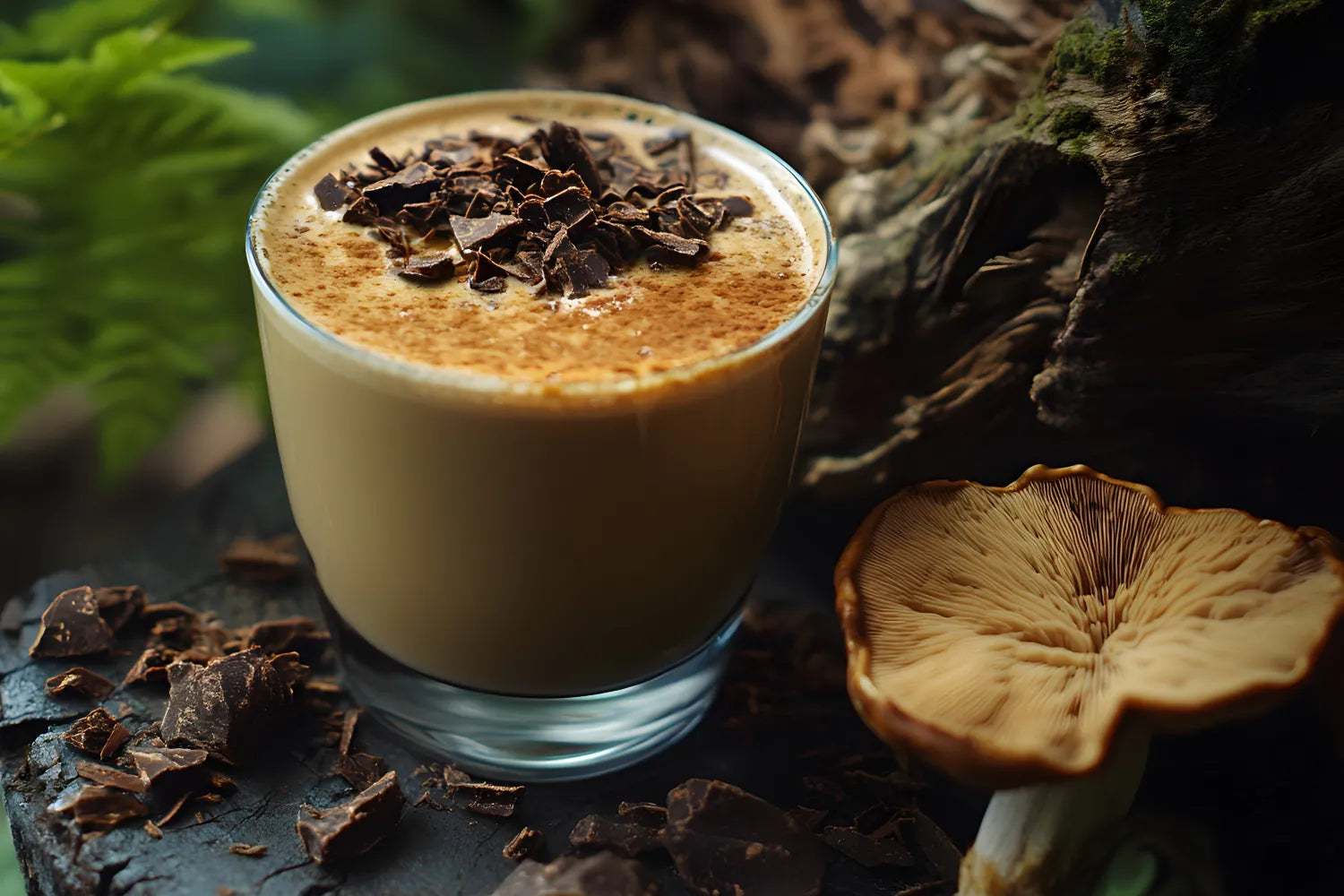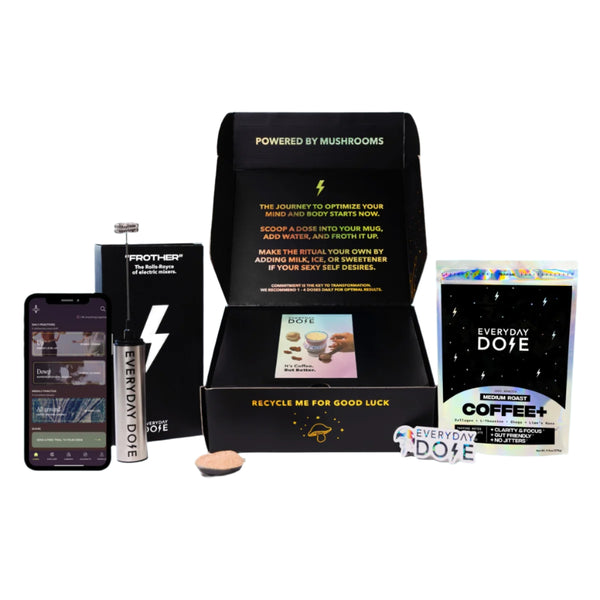Mushroom Drinks Market Booms: Trends & Insights

Mushroom drinks might sound like something your crunchy aunt discovered at a farmer’s market, but then again, you’ve probably also seen them all over the ‘Gram. There are so many brands out there now, each with its own trendy packaging and promises for your health. That said, there’s real data showing that mushroom drinks are more than just a wellness trend.
The market is exploding, Gen Z is chugging lion’s mane like it’s the new oat milk, and major retailers are stocking up. So what’s fueling the ‘shroom boom? Let’s talk about the numbers, benefits, and cultural shifts that back up these double-duty drinks.
What Are Mushroom Drinks?
Mushroom drinks are exactly what they sound like — beverages made with functional mushrooms (don’t worry, they’re not the psychedelic kind). These fungi-powered drinks come in all forms: hot mushroom coffees and lattes, cold drinks, powdered blends, teas, and even sparkling beverages.
The most common mushrooms you’ll see in these drinks are lion’s mane (for focus), reishi (for calm), chaga (for immune support), cordyceps (for energy), and turkey tail (for gut health). The drinks don’t taste like a portobello burger, either — they're usually blended with coffee, herbs, fruits, or even cacao to mask the earthy taste. When it comes to our Mushroom Coffee+, all you’ll taste is the robust flavor of Arabica coffee extract.
Some have a small amount of caffeine to help you feel motivated (like our mushroom coffee, which has only 45 mg per serving), while others are completely caffeine-free. Other brands provide extra caffeine, which you can probably tell isn’t our cup of tea (or coffee).
Is the Market for Mushroom Drinks Growing?
The global mushroom drinks market isn’t just growing — it’s thriving. In 2025, the market was valued at over $3 billion, and depending on which analyst you ask, it’s expected to hit over $4 billion by 2032. That’s a lot of lattes!
These drinks are projected to grow at a steady 5.5 to 6.7% compound annual growth rate (CAGR), according to major firms. The numbers vary depending on whether the data includes just mushroom coffee or all functional mushroom beverages, but the trend is crystal clear: people are drinking up.
This is due to a few reasons, but it all boils down to a growing demand for natural energy, better focus, and non-jittery alternatives to coffee. The rise of functional foods, the adaptogen hype, and wellness-forward marketing are making mushroom drinks fan favorites — and they’re definitely here to stay.
What Makes Mushroom Drinks So Popular?
So, mushroom drinks are popular — but why? Let’s look at some of the main factors behind their rise to fame.
Health Benefits
Functional fungi are packed with bioactive compounds like beta-glucans, antioxidants, and adaptogens that are associated with potential benefits for immunity, cognition, energy, and stress resilience. While most of the science so far is still in its early stages, the research (and centuries of traditional use) don’t lie. These mushrooms can support the body’s response to stress, encourage focus, and help maintain immune balance.
That’s why they’ve become darlings of the wellness world, often showing up in drinks marketed as “calming,” “energizing,” or “immune-supportive.” Consumers are hungry (and thirsty) for drinks that do more than hydrate. Combine that with a growing distrust of synthetic supplements and caffeine overload, and it’s not hard to see why mushroom drinks are “in” right now.
Product Innovation
Gone are the days when your only mushroom drink option came in a foil pouch from a fringe health store. Today’s mushroom beverages are sleek, shelf-stable, and surprisingly tasty, thanks to some major product innovation.
You can find everything from mushroom-infused cold brews in glass bottles to lion’s mane lattes with oat milk. Powdered drink mixes like our Mushroom Coffee+ (which also comes in two roast levels, by the way) let people customize their dose at home, while ready-to-drink (RTD) cans make it easy to sip adaptogens on the go.
Brands are also investing in better extraction methods, ingredient transparency, and third-party testing. They want it to be easier to understand what you’re drinking and why it works.
Flavor is also a huge priority — no one wants to sip something that tastes like mulch. So, companies are blending mushrooms with cacao, cinnamon, vanilla, or even matcha to create drinks that are as delicious as they are functional.
GenZ and Functional Habits
This wellness-savvy generation is leaning hard into functional beverages, and mushroom drinks are right in their sweet spot. According to multiple reports, Gen Z is skipping high-sugar sodas, traditional coffee, and even alcohol, which gives them plenty of space to sip on mushroom coffee, reishi shots, and other adaptogenic sips.
A recent UK report showed a whopping 1,500% increase in mushroom coffee searches on Ocado. But why is Gen Z so crazy about mushroom coffee?
Basically, Gen Z cares about mental clarity, mood, gut health, and sustainable ingredients — and they want it all without crashing or feeling wired. Mushroom drinks check every box: clean label (or at least ours is), low caffeine, and delicious enough to share with friends.
Most Popular Types of Mushroom Coffees
Not all mushroom drinks are created equal — and honestly, that’s part of the fun. Mushroom coffee is leading the charge, accounting for up to 77% of the functional mushroom drink market in some reports.
Mushroom teas are also gaining traction, containing mostly chaga, turkey tail, and reishi mushrooms. Ready-to-drink (RTD) elixirs and shots are coming in hot, too. And these drinks are no longer just health store staples. In some places, they’re stocked at major retailers and even at coffee shops.
Are Mushroom Drinks Actually Good for You?
While mushroom drinks have major trend appeal, their benefits go deeper than cool branding. Many mushrooms used in these drinks have been studied for centuries in traditional medicine systems like TCM and Ayurveda, and even modern science is starting to catch up.
Some of the benefits include the following:
- Cognitive Support: Lion’s mane may help support focus, mental clarity, and memory by encouraging the production of nerve growth factor (NGF).
- Immune Health: Turkey tail and chaga are rich in beta-glucans, which may support immune function and cellular defense.
- Stress Support: Reishi, cordyceps, and lion’s mane are adaptogens, which can help balance your body’s stress response and support the HPA axis.
- Energy Boost: Cordyceps has been shown to support energy and stamina, possibly by improving oxygen utilization during exercise.
- Antioxidant Activity: Chaga, reishi, and other functional mushrooms contain powerful antioxidants that may help neutralize oxidative stress.
- Gut Health: Lion’s mane mushroom polysaccharides may act as prebiotics and promote a healthy gut microbiome.
What’s Next for Mushroom Drinks?
The mushroom drink market isn’t slowing down anytime soon. Analysts project continued growth through at least 2033, driven by consumer demand for clean-label, functional, and adaptogenic beverages.
What does this mean for your cup, though? Brands are investing in better flavor profiles, sustainable sourcing, and standardized extractions, making these drinks more accessible (and delicious) than ever.
We’re also seeing expansion beyond specialty wellness shops into mainstream grocers, coffee chains, and convenience stores. In the next few years, you can also expect to see mushroom drinks that focus on mood, sleep, metabolism, and even skincare benefits.
The Bottom Line
Mushroom drinks might sound fringe, but they're actually a booming market category reshaping how we sip, energize, and support our well-being. With projected billions in growth and a huge variety of formats, these functional beverages are here to stay.
Whether you're reaching for focus, calm, or just a better coffee alternative, mushrooms can help. And let’s be real — you were going to drink a latte anyway, so might as well make it functional. Check out the Everyday Dose blog for more mushroom coffee insights and facts!
Sources:
Mushroom Coffee Market Size to Hit USD 5.29 Billion by 2034 | Precedence Research
Mushroom Coffee Market Size, Share & Trends Report, 2030 | Grand View Research
Mushroom Coffee Market to Reach $4.26 Billion by 2032 | Meticulous Research
Why Gen Z Is Drinking Less | TIME
This Is What Gen Z’s Happy Hour Looks Like Now | Athletech News
Mushroom Drinks Market Size, Share, Growth & Price, 2032 | Zion Research
Immunomodulatory Activity of the Water Extract from Medicinal Mushroom Inonotus obliquus | PMC
Start your day
The Right Way









